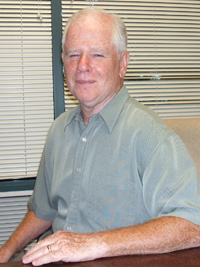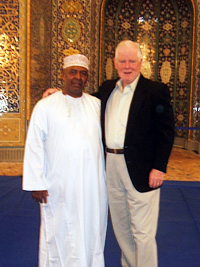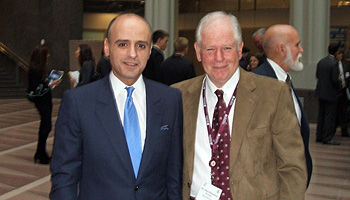By John Mulholland
By whatever genetic twist that has been in play, I have always been interested in other people’s cultures, countries, languages, and histories. At age ten a teacher remarked, “that’s as far away as Yemen.” I flattered myself that I knew every country on the globe but this was one I had obviously missed. I ran to the Atlas to fill the void. Although I found Yemen and its nearby countries of interest, I could hardly have imagined that, thirteen years later, I would dedicate most of my adult life to the Arab world and various aspects of the Arab-U.S. relationship.

At the age of seventeen, I was fortunate to spend over a year traveling around Mexico and Central America. The experience inspired me, for the first time, to learn a language and assimilate a culture. I joined the Army at eighteen years of age and was stationed in Livorno, Italy. At the time, I was a fanatical bicycle rider trying hard to be the first Lance Armstrong. After my Army stint I remained in Italy to race but finally realized, sadly, that I was not built to be a first rate professional rider. Even so, I gained another language and knowledge of another culture.
By chance, the headquarters for Middle East operations of the US Army Corps of Engineers was located at the Army base where I had served in Italy. They offered me a position in their Jeddah office running their high frequency communications. By then I had read everything I could find by the great mid-twentieth century traveler and explorer in the Arab world, Wilfred Thesiger, who stoked my romantic interest. I also read everything else I could find on the region. I already knew the general geography, a little history of Saudi Arabia and the Arab-Israeli conflict, but none of this prepared me for Beirut, where I landed in October, 1968 during what in retrospect was viewed by many as the city’s golden age in the modern era. Nothing could have prepared me for the kaleidoscope of cultures, cuisines, and languages I found there, all picture postcard framed by the Mediterranean Sea in front and the terraced mountains behind. I said to myself, “If this is the Middle East, I’ll take it.”
Only a few days later I landed in Riyadh. If Beirut was filled with Western influences that I was familiar with, Riyadh was different. I was hardly put off, I was ecstatic. Now, after Latin America and Italy, I felt prepared to tackle another culture and language. I quickly found a superb classical Arabic teacher who within a month had taught me to write, basic grammar, and the beginnings of Gulf dialect. In those days, Riyadh was still a city constructed mainly of mud brick dwellings, with a road into the desert to the airport lined by Egyptian-built ministerial offices. On weekends and holidays, I used every spare minute to explore Riyadh, the central province of Najd, and also the Eastern Province, center of the country’s massive energy reserves.
All too soon, I was moved to my permanent assignment in Jeddah. Even though Riyadh was the capital of the kingdom, all the embassies and most of the foreign companies were in Jeddah. (The Corps of Engineers was the first foreign concern allowed to be established in Riyadh). In Jeddah I was fortunate to find an office of only five people and was able to avoid having to live in a corporate compound. If Americans or any other foreigners wanted a social life, they had to go out and make it. I soon found that Jeddah offered incredible opportunities. Many of our government’s best diplomats and Arabists served in the US Embassy in Jeddah in the 1960s and 70s. People like Hermann Eilts, Ray Close, Charles Cecil, Bill Stoltfuz, and, to my mind and many others, the most remarkable of them all, Hume Horan, who would become a lifelong friend and mentor, were stationed there.
My neighbor was Sultan Ghalib al-Qa’iti, the then recently exiled Sultan of Qa’iti State, one of the numerous former British-administered protectorates of the Hadramaut, that eastern region of what until November 1967 was long known as the Eastern Aden Protectorate that, upon the transfer from colonial sovereignty to national independence, would become part of the People’s Republic of South Yemen (1967-1969) and its successor, the People’s Democratic Republic of Yemen (1969-1990). (His remarkable wife, Sultana (her real name), is a sister of the renowned Pakistani journalist, Ahmed Rashid). Through Sultan Ghalib, I got to know members of most of the rest of the exiled ruling families from South Arabia and was introduced to their remarkable and fascinating sub-culture. Through Sudani friends I was introduced to groups from various parts of the Sudan and, in particular, citizens of the northern city and area called Dongola.

In short order, I became a squash player. Anyone who knows the game will not be surprised that this sport afforded me a unique window into Pakistani society and culture. My friends and I also had an organized running group (to which we invited the Saudi national track team). Through this group I developed a wider range of friendships from Indonesia to Tanzania, all connected by a common Hadrami heritage. The point is that Jeddah, having been both the entrance to the Hajj for fourteen centuries and home to most of the country’s foreigners, offered an incredibly rich cultural environment. Where else in the Arab world could one become familiar with half a dozen Arabic dialects in one location?
If that weren’t enough, what about Jeddah being host to some of the best diving in the world in the Red Sea? Or what of the unique opportunity to participate in an economic and commercial gold rush of a magnitude that the region had never seen before? At one time there were 200 ships backed up in the Port of Jeddah to unload and some were unloaded by helicopter.
When I left Italy I had left my Italian girlfriend behind. For the next two years I used up every spare penny I had commuting to Italy. Finally we decided there was only one option besides bankruptcy: get married. Marriage for a foreigner in Italy is the Mt. Everest of all bureaucracies. It would have taken at least a couple of years to fulfill all the requirements. I discovered that since there was only one law in the Kingdom, Islamic religious law (Shariah), that it therefore applies to all, Muslim and non-Muslim alike. Yes, we could get married in Saudi Arabia. Mercifully the documentation requirement was minimal. We had a civil wedding which consisted of an interview through an interpreter by a local Islamic judge (qadi). The process went smoothly enough until the very end when the judge advised the bride not to kiss the groom in respect of the local culture. Gabriella politely obeyed. However we had about eight, all male, friends with us. She hugged and kissed them all. I tried to intervene but her response was, “the judge told me I couldn’t kiss you but said nothing about the others.” I think the old fellow (a very nice and kind gentleman) is still shaking his head. The moral of the story is obviously that you can take the Italian out of Italy but you can’t take Italy out of an Italian.
During her two decades of residency in the Kingdom Gabriella carved out her own unique life. In, fact, for my years, in certain circles, I was often introduced, simply, as Gabriella’s husband. She opened her own boutique representing a famous Italian dress designer. With seven models she traveled Saudi Arabia putting on fashion programs for mainly Saudi ladies. These were done with a runway, flashing lights, synchronized music, and as many as 500 people in attendance. Who says life for ladies in the Kingdom has to be terribly restricted?
While living in Riyadh the Italian Embassy (then in Jeddah with no presence in Riyadh) asked Gabriella to follow up an Italian engineer who was being held in jail to force his Italian employer to return to the country to make good on the bills he owed. She worked closely with the Italian authorities, the Saudi authorities, and Rafik Hariri (yes, the same man who would later become the Prime Minister of Lebanon and be tragically assassinated on Beirut’s Corniche) to finally resolve this situation. In the process she assisted many others being held without judgment as to their individual cases. The upshot of her efforts was to be recognized by the Italian government with the title of “Cavaliere della Repubblica Italiana,” Italy’s equivalent of knighthood and its highest civilian award. I couldn’t be prouder.
I returned to the United States during 1978-9 to obtain a long-missing Bachelor’s Degree in Business Administration. In 1979 I returned to the Kingdom to start my own firm with a Saudi Arabian partner. Because I spoke halfway decent Arabic and had lived in the Kingdom for eight years, I thought I knew Saudi Arabia. Big mistake. Few people really know the kingdom unless they have been an entrepreneur, especially a small one. It is one thing to work for a firm filling some specific role. It’s quite another to have to get to know the government entities for company registration, postal service, port clearance, commercial adjudication, and other requirements for operating a business in the country. Sales are always tough, but collections are a chapter unto themselves.
My company was small but we had customers in eleven cities throughout the kingdom. This gave me the opportunity to know the country in a way that few can. Saudi Arabia, on first impact, can appear to be a dry and sterile place. However, my travels introduced me to a variety of life that one can hardly imagine. When I asked a date farmer in Hofuf how many hectares (roughly two and a half acres) were covered by his date farm, his answer was, “I don’t know but I have between 2-3 million trees.” Many know of the famous Nabatean archaeological treasure in Jordan, Petra (overcarved by the Roman motifs of Trajan’s armies) and those in Syria, but how many know of the incredible Nabatean ruins at Mada’in Saleh? We think of the kingdom as one vast desert, and most of it is, but it is hard to believe that when visiting the terraced mountains of the Asir in the country’s southwest. Hail, a six-hour drive north of Riyadh, is called the “Pearl of the North,” and when you visit it you will know why.

Now that I was a businessman, I joined the American Business Association in Jeddah (ABJ). I quickly headed up the Issues Committee, which was an education in U.S.-Saudi Arabian relations. I developed a specialty in trade, tax, and arms sales issues, and was soon leading delegations to Washington, initially under the wing of the U.S. Chamber of Commerce, to represent our issues to members of the Legislative and Executive Branches of the U.S. government. These visits to Washington were called “Doorknocks” and eventually involved all the U.S. business associations throughout the Gulf region. In time, we learned which Members of Congress and congressional staff to visit on which issues.
In this process it was inevitable that we would become involved in policy-related issues related to America’s relations with the Arab world. In 1987-88 I was elected President of the ABJ. We were assisted by several groups but none more than the National Council on U.S.-Arab Relations. In turn, we were only too happy to reciprocate the Council’s support in Washington by offering the same assistance and hospitality for its visiting delegations of American leaders to the kingdom. How many people know that the Council, assisted by the various groups of American business representatives in the Kingdom, played a key role in influencing the views of prominent members of Congress together with innumerable Chiefs of Staff, state governors, and many more. We also became involved in visits for American professors to the kingdom’s universities.
These activities allowed me to enter into diplomatic and commercial circles that I would never have been able to access otherwise. Here I refer to diplomatic briefings at the ambassador level, introduction to the highest levels of the kingdom’s commercial associations and major companies, meetings with key members of the ruling Al Sa’ud family, and an introduction to Saudi Arabia’s intellectual society. It was an extraordinary experience and education.
Thinking I should formally acquire additional education on the region, I was accepted in 1999 into Georgetown’s MAAS (Master of Arts in Arab Studies program) from which I graduated with a Master’s Degree in Arab History in 2001.
I have always maintained close ties to the National Council over the years and couldn’t have been more honored than when I was invited to join its Board of Directors in 2009. Since then I have assisted with the Council’s Atlanta High School Model Arab League, co-escorted representatives of the U.S. Central Command (selected by Commanding General David H. Petraeus) to participate in a cultural immersion course in Oman, and supported the Council in any way possible.
My commitment to the National Council on U.S.-Arab Relations is influenced by the high esteem I hold for its Founding President and CEO, Dr. John Duke Anthony, and other key members of the organization. The overarching reason, however, is that, after all my years in the Arab region, I remain appalled by the abyss of understanding between our two worlds and committed to do whatever I can to help close this vital gap. In spite of the long road still in front of us, I know of no group that comes within miles of educating America on the Arab world as much as the Council and I couldn’t be prouder of my association with it.
